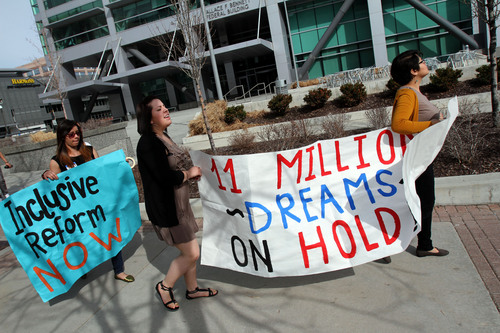This is an archived article that was published on sltrib.com in 2013, and information in the article may be outdated. It is provided only for personal research purposes and may not be reprinted.
The comprehensive immigration reform package that came out of the Senate in June was a well-crafted, bipartisan deal that did the best job possible of getting from a status quo that pleases no one to a system that makes legal, economic and humanitarian sense.
So, naturally, it has been stuck in the House ever since.
This week, hoping to get the Republican-controlled, tea party-spooked House to move on the issue, emissaries from business and human rights groups from around the country, including not a few from Utah, descended on Washington.
Their ideal would be for the House to move the Senate bill to the floor for a vote. Failing that, getting the House to pass an immigration bill of its own, then move to a House-Senate conference committee for a final draft, could also accomplish a lot.
Sadly, Utah Reps. Jason Chaffetz and Chris Stewart are among the many conservative Republicans who oppose a comprehensive reform bill. They do so because, to be worthy of the name, real reform would have to include a long-term resolution of how to handle the estimated 11 million human souls who now reside in this nation without legal documentation.
The Senate's solution — backed by many Republicans, including Utah's Orrin Hatch — was a 13-year "path to citizenship." Opponents of that provision, including Chaffetz, Stewart and Utah's other senator, Mike Lee, dismiss that step as "amnesty."
Which is easy for someone who already has full citizenship to say. But it isn't accurate.
An amnesty is a blanket, often condition-free, pardon for sins real or imagined, past or future. The word does not properly apply to an obstacle course of fines, fees, taxes, tests and, most of all, waiting that would stand between current residents — even those who have been working and paying taxes here for decades — and final citizenship.
If anything, as reform advocates of both parties have often pointed out, the current situation amounts to a de facto amnesty, in which the nation has neither the will nor the means nor the incredibly cold heart necessary to actually turn 11 million mostly striving Americans-in-all-but-name out of the country.
If its members were out to do the right thing, the House would pass the Senate bill right away. Because they are out to do the political thing, it is going to take a little longer.
The many backers of real reform, including the many Republicans who are right on this issue, should not give up.



